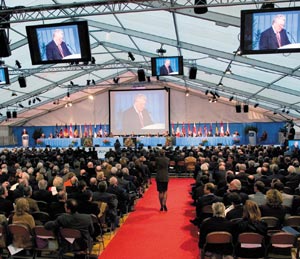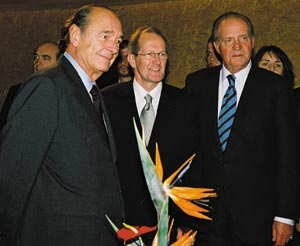Heads of state, representatives from many countries, and scientists and engineers from CERN’s past, present and future research in particle physics attended the laboratory’s official 50th anniversary ceremony on 19 October. The speakers praised the organization for its advancement of science and for fostering international collaboration, both among scientists and between countries, across Europe and beyond.

Juan Carlos, the King of Spain, Jacques Chirac, President of the Republic of France, and Joseph Deiss, President of the Swiss Confederation, were joined by delegations from member and observer states. Before the ceremony, Jacques Chirac visited the construction site for the CMS experiment in Cessy, France, and later he joined Joseph Deiss and Juan Carlos on a tour of the ATLAS cavern. Juan Carlos also took the time to meet many of CERN’s Spanish scientists.

Immediately before the ceremony, the heads of state and the delegations gathered in the recently erected Globe of Science and Innovation. This large, spherical building made entirely of wood was donated by the Swiss Confederation in honour of the 50th anniversary. In the Globe, which is as big as the dome of St Peter’s Cathedral at the Vatican, a multimedia presentation tailored to each country played while the representatives entered and signed the gilded visitor’s book.

Robert Aymar, director-general of CERN, began the series of speeches at the event. François de Rose, the sole surviving founder of the organization, gave a first-hand account of how CERN arose from the ashes of the Second World War. Also speaking were Federico Mayor, former director of UNESCO; Maria van der Hoeven, minister of education, culture and science of the Kingdom of the Netherlands (speaking on behalf of the president of the European Council, who was recovering from a severe illness); Robert Cramer, president of the Geneva State Council; and the heads of state, Joseph Deiss, Jacques Chirac and Juan Carlos. Enzo Iarocci, president of the CERN Council, closed the ceremony.
A common theme in the speeches was how CERN should continue to serve as a model of scientific rigour and international co-operation. Speakers pointed to how scientists at CERN have deepened our knowledge of nature, while also creating technologies of practical importance, such as new types of medical imaging equipment and the World Wide Web.







